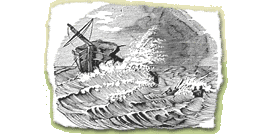

Three-score-and-ten
Sailors,
Fishing
Archival information
Humber,
Yarmouth,
Scarborough
Lyrics
1
Methinks I see a host of craft spreading their sails alee,
As down the Humber they do glide all bound for the northern sea.
Methinks I see on each small craft a crew with hearts so brave,
Setting out to earn their daily bread upon the restless wave.
Chorus
And it's three-score-and-ten boys and men were lost from Grimsby Town,
From Yarmouth down to Scarborough many hundreds more were drowned,
Our herring craft, our trawlers, our fishing smacks as well,
They long to fight that bitter night and battle with the swell.
2
Methinks I see 'em yet again as they leave the land behind,
Casting their nets into the sea, those fishing shoals to find.
Methinks I see 'em yet again and all on board's alright,
With the sails close-reefed and the decks cleared up and the sidelights burning bright.
3
October's night was such a sight, 'twas never seen before,
When masts and spars and broken yards came floating to the shore.
There was many a heart of sorrow, there was many a heart so brave,
There was many a hearty fisher lad who found a watery grave.
Recording made in January 2007 and kindly donated to Yorkshire Garland.
'Three score and Ten' are Jim Potter, Ivan Robinson and Brian Senior from the West Riding. Roud 16873
Archival information
Humber,
Yarmouth,
Scarborough
This is a traditional song about Yorkshire, collected in Yorkshire.
Provenance
Three-score-and-ten, sung by Jim Potter and his appropriately named group 'Three Score and Ten' Jim preceded his performance with the following introduction:-
'Hull Times, 2nd of March, 1889. As day after day passes and no tidings arrive of the missing Grimsby smacks, it is beginning to be realized that the gale of the 9th will prove one of the most disastrous to the Grimsby fishing trade on record. All together nearly a dozen fishing vessels carrying between 60 and 70 hands are missing. Most of these vessels were only provisioned for 8 or 9 days and many of them have been out now for over a month. Of the safety of 7 of them all hope has now been abandoned. Portions of the wreck from the 'Kitten' have now been picked up at sea and brought into port, and the 'British Workman' was seen to be reduced to a mere wreck by a heavy sea on the morning of the gale. Many of the men who have been lost leave wives and families and an immense amount of distress will be caused among the fishing population. The total number of vessels lost will, it is feared, be near 15 and between 70 and 80 lives of men and boys.
The vessels lost were:-
- The Sea Searcher, trawl smack, 5 hands
- The John Witterington, 11 hands
- The Eton, iron steam trawl smack, 8 hands
- The British workman, cod smack, 7 hands
- The Sir Frederick Roberts, trawl smack, 5 hands
- The Kitten, trawl smack, 5 hands
- The Harold, trawl smack, 5 hands.
Though this disaster song was composed in Grimsby it belongs rightly to the whole of the fishermen of the east coast, and we have the Filey Fishermen's Choir to thank for the preserving of this splendid oral version. The event it is based upon occurred as late as 1889 and William Delf, its author, had his song printed on a broadside no doubt to raise money for the relief of the bereaved families.
We have to thank Grimbarian song-writer and librarian John Conolly for unearthing the original broadside, which since has been much copied. The song has become very popular in the current folk revival having been recorded by Yorkshire's singing family, The Watersons.
Nigel Hudleston has suggested that the tune is based on Jingle Bells which was composed in America as a minstrel song in 1867. The Hudleston version as sung by Jack Pearson and The Filey Fishermen's Choir can be found in Songs of the Ridings, Pindar, 2001, p45, along with a copy of the original broadside. The recording was released on an EP produced by Excel Services in the 1960s.

